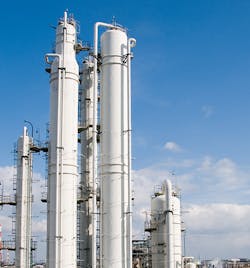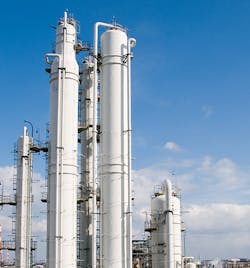AI Runs Chemical Plant Autonomously For 35 Days
Distillation columns at the JSR chemical plant
Yokogawa Electric Corporation and JSR Corporation successfully conclude a field test in which AI was used to autonomously run a chemical plant for 35 days, a world first according to the companies. The companies say the test confirms that reinforcement learning AI can be safely applied in an actual plant, and demonstrates that the technology can control operations that have been beyond the capabilities of existing control methods (PID controlAPC) and have up to now necessitated the manual operation of control valves based on the judgements of plant personnel. The initiative was selected for the 2020 Projects for the Promotion of Advanced Industrial Safety subsidy program of the Japanese Ministry of Economy, Trade and Industry.
In the field test, the AI offering successfully dealt with the complex conditions needed to ensure product quality and maintain liquids in the distillation column at an appropriate level while making maximum possible use of waste heat as a heat source, according to the companies. In so doing it reportedly stabilized quality, achieved high yield and saved energy.
The AI used in the control experiment, the Factorial Kernel Dynamic Policy Programming (FKDPP) protocol, was jointly developed by Yokogawa and the Nara Institute of Science and Technology (NAIST) in 2018, and was recognized at an IEEE International Conference on Automation Science and Engineering as being the first reinforcement learning-based AI in the world that can be utilized in plant management, according to the companies. Through initiatives including the successful conduct of a control training system experiment in 2019 and an experiment in April 2020 that used a simulator to recreate an entire plant, Yokogawa says it has confirmed the potential of this autonomous control AI and advanced it from a theory to a technology suitable for practical use. It can be used in areas where automation previously was not possible with conventional control methods and its strengths include being able to deal with conflicting targets such as the need for both high quality and energy savings.
Regarding the transition to industrial autonomy, a very significant challenge has been instituting autonomous control in situations where until now manual intervention has been essential, and doing so with as little effort as possible while also ensuring a high level of safety. The results of this test suggest that this collaboration between Yokogawa and JSR has opened a path forward in resolving this longstanding issue, according to the companies.
For more information, visit: www.yokogawa.com

